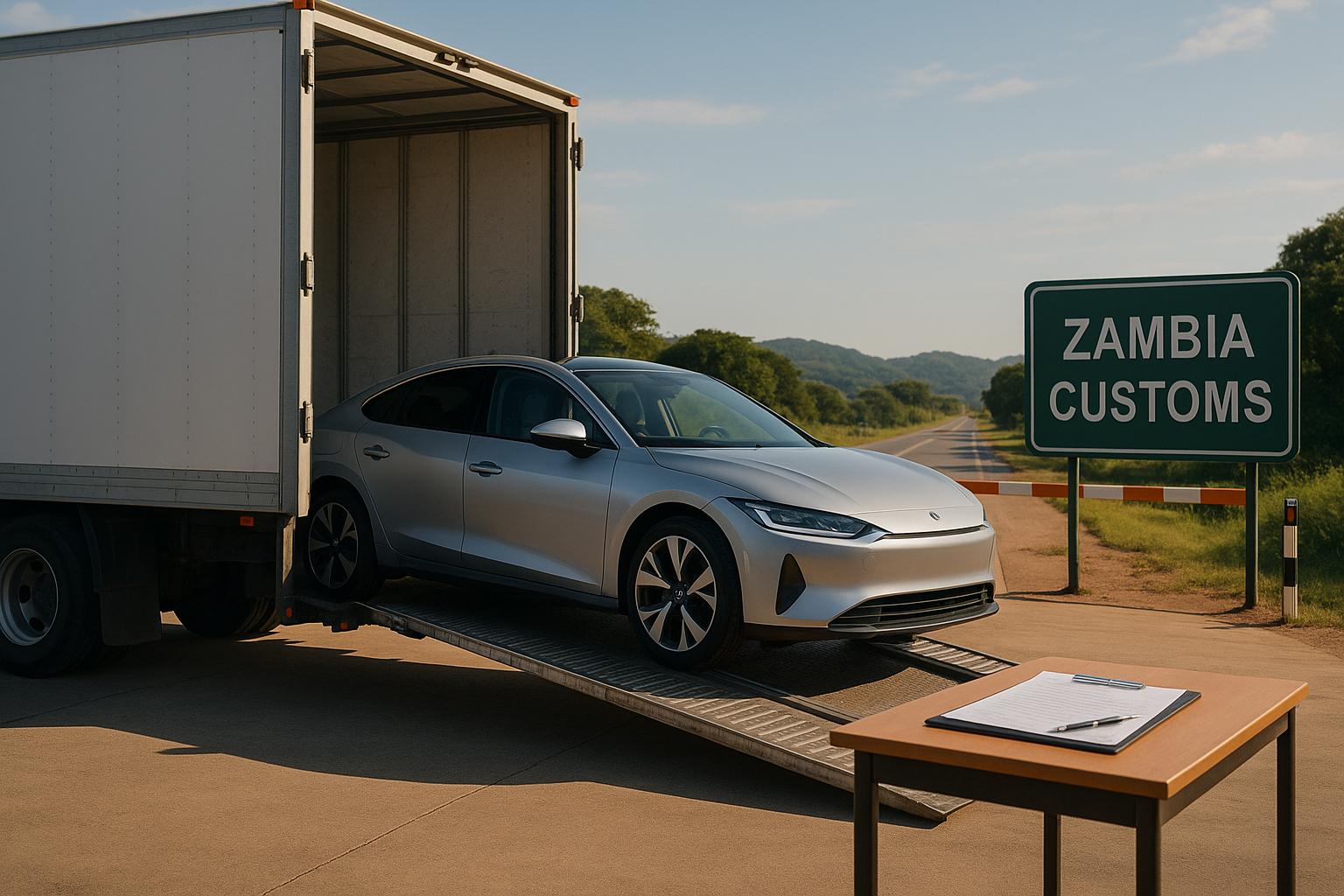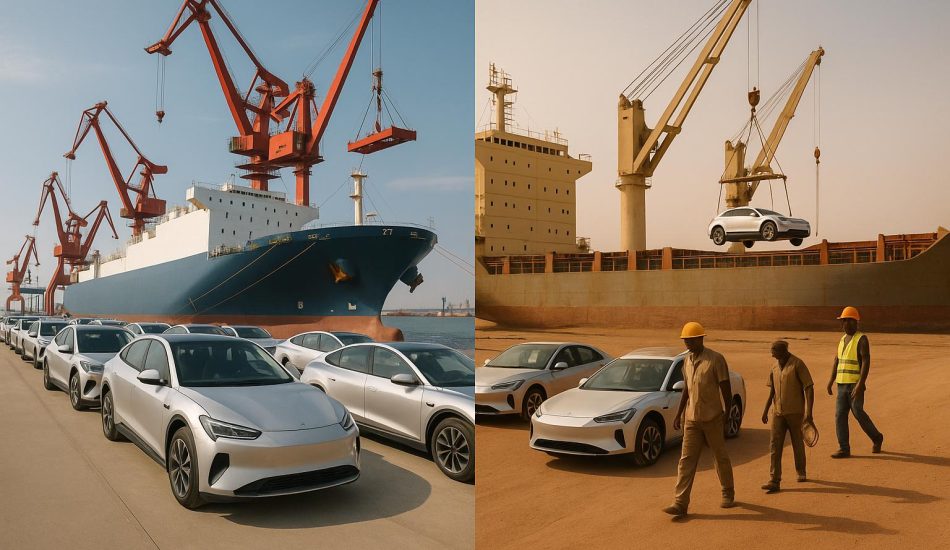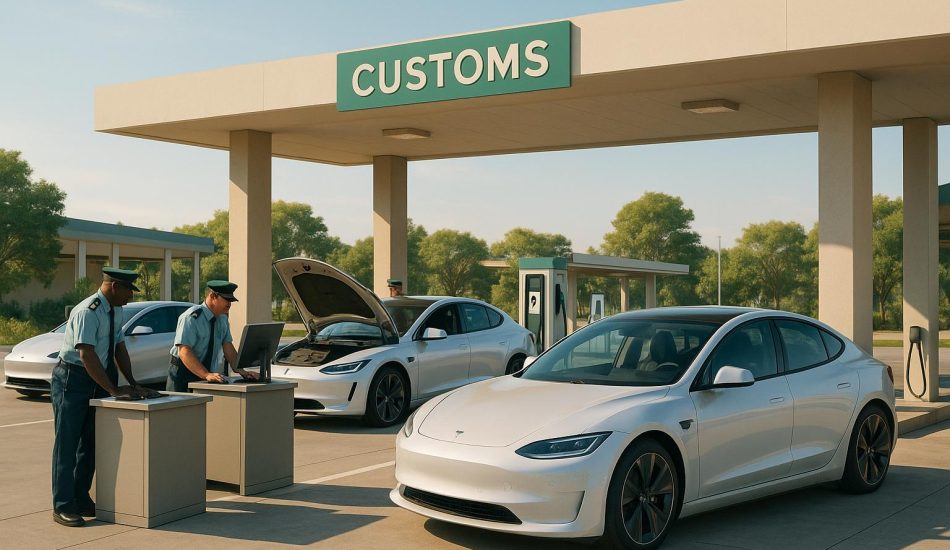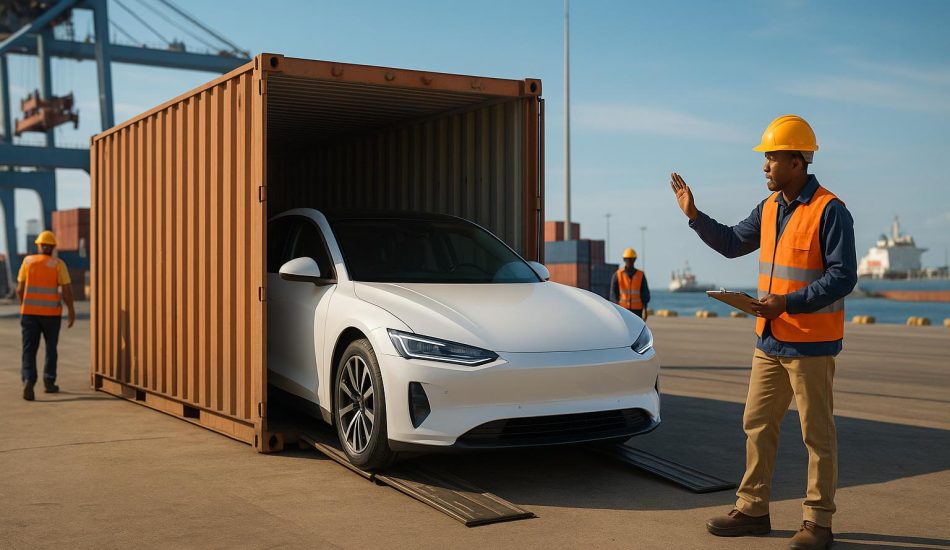
Zambia is now one of Africa’s most EV-friendly markets. Here’s what you need to know about importing electric vehicles (EVs) into the country in 2025:
- Zero Customs Duties: EVs and charging infrastructure are exempt from customs duties.
- Reduced Excise Tax: Hybrid vehicles now have a lower excise duty rate (25% instead of 30%).
- 16% VAT: Import VAT applies to EVs, calculated on the CIF (Cost, Insurance, and Freight) value.
- Hydropower Advantage: Zambia’s reliance on hydroelectric power makes EVs cheaper to operate.
- Safety & Compliance: EV imports must meet specific technical and safety standards, including pre-shipment inspections and battery certifications.
- Required Documentation: Bills of lading, import forms, invoices, and customs clearance certificates are essential for the process.
- Registration Process: Includes roadworthiness inspections, Interpol clearance, and fees for registration, number plates, and carbon surtax.
Quick Tip:
Platforms like EV24.africa simplify the import process by handling customs clearance, compliance, and shipping logistics, making EV ownership more accessible.
Zambia’s policies, abundant renewable energy, and growing partnerships with global EV manufacturers make it an attractive destination for EV imports and investments.
ZAMBIA REVENUE AUTHORITY – IMPORTATION OF MOTOR VEHICLES AND CHANGE OF MOTOR VEHICLE OWNERSHIP

Import Tariffs and Taxes for Electric Vehicles
This section breaks down the cost components involved in importing electric vehicles (EVs) into Zambia, including customs duties, VAT, and other associated taxes.
Customs Duty and Excise Tax Rates
In Zambia, customs duties on electric vehicles and charging infrastructure are fully waived. For other vehicle categories, customs duty rates typically range from 0% to 40% depending on the type of vehicle.
For hybrid vehicles, the excise duty is reduced from 30% to 25%. While EVs benefit from duty exemptions, they are still subject to VAT at a rate of 16%, calculated on the CIF (Cost, Insurance, and Freight) value plus any excise duty. The Zambian Electric Mobility and Innovation Alliance (ZEMIA) has proposed further tax relief, such as reducing or exempting VAT for EVs and their components, which could lead to additional cost savings in the future.
There is also a carbon emission surtax applied based on engine capacity, ranging from K246.40 to K484.00.
How to Calculate Import Costs
To calculate the total cost of importing an EV, start with the vehicle’s CIF value. For EVs, VAT is charged at 16% on this CIF value. For hybrid vehicles, the calculation includes the reduced excise duty. Additionally, the carbon emission surtax is added, depending on engine specifications.
These taxes and fees form the foundation of the import cost, but there are other expenses to consider as well.
Other Fees and Expenses
Beyond taxes, importers need to account for several other costs, including:
- Vehicle registration fees
- Clearing and forwarding charges
- Warehouse storage fees (which depend on the vehicle’s value and storage duration)
- Licensing fees
If you hire professional import consultants, their service fees will also add to your overall expenses. For the most accurate and up-to-date fee schedules, consult the Zambia Revenue Authority’s website. Factoring in all these elements ensures a more complete budgeting process for your EV importation.
Zambia’s Regulatory Standards and Compliance for EV Imports
Zambia is shaping its regulatory framework to manage the importation of electric vehicles (EVs) effectively. The country aims to become a hub for EV battery production and assembly while ensuring that imported vehicles meet strict safety and compliance standards. These regulations are crucial for supporting Zambia’s ambitions in the EV sector and are detailed below.
Energy Regulation Standards
Zambia’s Energy Regulation Standards set the technical benchmarks for EV imports, building on the supportive policies previously outlined. The Energy Regulation (General) Regulations 2023 define the requirements that EVs must meet to enter the Zambian market. This regulatory shift aligns with the country’s transition from exporting raw materials to manufacturing EV components.
In December 2022, Zambia signed a trilateral agreement with the Democratic Republic of Congo and the United States to develop an integrated EV battery value chain. This agreement directly influences import standards, requiring EVs to comply with specific energy efficiency and safety measures, particularly concerning battery safety and electrical systems compliance.
Required Documentation
Meeting these technical standards is only part of the process; importing EVs also requires thorough documentation. The Zambia Revenue Authority (ZRA) manages customs clearance through the Automated System for Customs Data (ASYCUDA) platform.
For commercial imports, essential documents include:
- Bills of lading or airway bills
- Commercial invoices
- Import Declaration Form
- ZRA Form CE 20
For non-commercial or personal imports, a self-declaration form is necessary to confirm non-commercial use. Shipments valued over USD 2,000 require integration with ASYCUDAWorld, while those under USD 2,000 use Customs Declaration Form CE6.
Obtaining a Customs Clearance Certificate involves submitting:
- ZRA Receipt
- Supplier Invoice
- Release Order
- Physical inspection reports from RTSA and Interpol
- Export Certificate
- Evaluation Paper
- Bill of Lading
- A copy of the applicant’s national ID, passport, or driver’s license
For vehicle registration, you’ll also need:
- A valid insurance cover note
- Physical Inspection Report
- Interpol Motor Vehicle Clearance
- Customs Clearance Certificate
- Identification documents
Safety and Compliance Requirements
Once the paperwork is in order, ensuring the vehicle meets safety standards is the next step. All imported EVs must undergo a pre-shipment inspection to verify roadworthiness and safety. This inspection includes checks for emissions, odometer accuracy, and structural integrity. Inspection costs range from USD 140 to USD 350, depending on the vehicle type and the inspecting agency, such as JEVIC or EAA. Skipping this step can result in hefty penalties based on the vehicle’s CIF (Cost, Insurance, and Freight) value.
Additionally, certain certifications are required for EV-specific components like batteries and electrical systems. Importers must confirm the latest compliance requirements with relevant agencies before starting the process.
sbb-itb-99e19e3
Step-by-Step Import Process
Importing an electric vehicle (EV) into Zambia involves careful planning and following specific regulatory and customs procedures. The journey consists of three main phases: sourcing and purchasing your EV, handling shipping and customs clearance, and completing payment and registration.
Sourcing and Purchasing EVs
The first step is to find the right vehicle and a trustworthy supplier. Platforms like EV24.africa make this easier by connecting you with verified suppliers and providing detailed vehicle specifications. When selecting an EV, ensure the supplier is reputable and that the vehicle meets Zambia’s import standards.
Zambia’s position as Africa’s second-largest copper producer and its collaboration with international automakers create a favorable environment for sourcing EVs. Additionally, Chinese firms are exploring EV assembly plants in Zambia, which could expand available options in the near future.
When purchasing your EV, ensure you receive all necessary paperwork from the supplier, including the original title, purchase invoice, and manufacturer certifications. These documents are essential for customs clearance. Once you’ve secured your EV and its paperwork, you’re ready to move on to shipping and customs clearance.
Shipping and Customs Clearance
After purchasing your EV, the next step is organizing shipping and navigating Zambia’s customs procedures. The Zambia Revenue Authority (ZRA) oversees customs clearance, which is managed through the Automated System for Customs Data (ASYCUDA) platform.
Start by arranging freight and gathering all required documents. Ensure you have everything listed in the "Required Documentation" section. The classification of your shipment depends on its CIF (Cost, Insurance, and Freight) value. For shipments valued between USD 1,000 and USD 2,000, a clearing agent is not required. However, for consignments exceeding USD 2,000, you’ll need to work with a licensed clearing agent.
Submit the customs declaration via the ASYCUDA platform before the vehicle reaches the border. EV24.africa can assist with this process, guiding you through the documentation and compliance requirements. Once customs clearance is complete, you can move on to payments and registration.
Payment and Registration
The final phase involves settling duties and registering your vehicle. Start by obtaining a Customs Clearance Certificate from the Zambia Revenue Authority (ZRA). You’ll also need an Interpol Motor Vehicle Clearance from the Zambia Police to confirm your vehicle’s legal status. Next, have your EV undergo a roadworthiness inspection at an RTSA-approved center. This inspection verifies the chassis and engine numbers, assesses the vehicle’s mechanical condition, and ensures it meets safety standards.
With all documentation in place, visit the nearest Road Transport and Safety Agency (RTSA) office to complete the registration process. For faster service, you can use the RTSA Premium Centre located at the Government Complex in Lusaka. You’ll need to fill out Form RVT and pay fees for vehicle registration, number plates, road tax, and carbon emission tax. Accepted payment methods include POS systems, bank deposits, and mobile money.
Once registered, you’ll receive Zambian registration numbers, official number plates, and the Motor Vehicle Registration Certificate (commonly known as the White Book). The final step is securing valid insurance coverage, as third-party insurance is mandatory in Zambia. Keep copies of your insurance certificate, White Book, proof of tax payment, and Certificate of Fitness in your vehicle at all times.
Collaborating with a licensed clearing agent throughout this process can help you meet all requirements and avoid unnecessary delays or penalties.
The Role of EV24.africa in Zambia’s EV Import Market

EV24.africa has positioned itself as a go-to platform for Zambians looking to import electric vehicles (EVs), offering tailored services that simplify the process. This approach aligns perfectly with Zambia’s deregulation measures, as discussed earlier, which aim to encourage the adoption of green transportation. By addressing the challenges of EV importation, EV24.africa provides a seamless, end-to-end solution for buyers in Zambia.
In 2024, Zambia removed customs duties on EVs and charging systems while reducing excise duties on hybrid vehicles from 30% to 25%. These policy changes make EV24.africa’s services even more appealing, especially for those looking to save on costs while transitioning to environmentally friendly vehicles.
"We’re here to make it easy. At EV24.africa, we simplify the process of importing and buying electric vehicles in Africa. Our expertise ensures a seamless, transparent, and stress-free experience, so you can focus on driving the future of mobility."
– EV24.africa
Features and Benefits of EV24.africa
What sets EV24.africa apart is its wide selection of brands and transparent pricing. The platform connects buyers to major EV manufacturers, including Tesla, BYD, Volkswagen, XPeng, Leapmotor, Changan, Wuling, Mercedes-Benz, Citroën, and Peugeot. Vehicles are sourced from key global markets such as Europe, China, North America, and Japan, ensuring access to a variety of options.
Additionally, EV24.africa has an efficient logistics network that supports both door-to-door and port-to-port delivery. This flexibility allows customers to choose the option that best fits their needs and budget, all while benefiting from dedicated local support throughout the process.
To make EVs more affordable, EV24.africa collaborates with financial institutions to provide financing solutions. This partnership helps expand access to EV ownership for a broader range of buyers in Zambia.
How EV24.africa Simplifies EV Imports
EV24.africa takes the complexity out of importing EVs, especially for first-time buyers. The platform handles critical technical details, including customs clearance and compliance with documentation requirements, ensuring a smooth process from start to finish.
Customers receive comprehensive support with customs declarations, compliance certificates, and regulatory submissions. This reduces the risk of delays or penalties, making the entire experience more predictable and stress-free.
One standout feature is the Delivered Duty Paid (DDP) service, which ensures that all import duties, taxes, and fees are handled upfront. This eliminates uncertainty about final costs and provides peace of mind for buyers. Real-time tracking further enhances the customer experience by keeping them informed at every stage of shipping and customs clearance.
EV24.africa also ensures that all imported vehicles meet Zambia’s regulatory and safety standards before shipment, minimizing potential delays during registration. For businesses and fleet operators, the platform offers bulk purchasing options and dealer plans, making it an essential partner for companies looking to adopt EVs. With Zambia’s abundant hydroelectric power and supportive policies, the shift to electric mobility is becoming increasingly attractive, and EV24.africa is well-positioned to lead the charge.
Key Takeaways
Zambia has introduced policies aimed at making electric vehicles (EVs) more accessible. By 2025, the country will eliminate customs duties on EVs and reduce excise duties on hybrids from 30% to 25%. With most of its electricity generated from hydropower, Zambia offers a renewable and cost-effective energy source, creating an ideal environment for EV adoption. These policy changes simplify the import process and encourage a shift toward cleaner transportation.
That said, importing EVs still involves various costs. While customs duties are no longer applicable, importers must account for a 16% Import Value Added Tax (VAT), motor vehicle registration fees, warehouse rentals, and a carbon emissions surtax. Final tax calculations are based on the Value for Duty Purposes (VDP), which converts the Cost, Insurance, and Freight (CIF) value into Zambia’s local currency.
Navigating the regulatory process requires attention to detail. Importers must obtain ASYCUDA World pre-clearance at least five days before the vehicle arrives and ensure all necessary documents are submitted to avoid a penalty of ZMW 500.10. Partnering with licensed clearing agents can help streamline these steps, ensuring compliance with local regulations.
The import process encompasses sourcing vehicles globally, managing shipping logistics, and handling customs clearance. For used vehicles, pre-shipment inspections are mandatory, and some vehicle types require advance certifications from specific agencies.
To make this process easier, platforms like EV24.africa provide comprehensive import services. They handle customs clearance, registration, and tax payments while ensuring all local regulations are met. The platform also offers real-time tracking, flexible shipping options, and access to a variety of EV models from trusted brands like Tesla, BYD, Leapmotor, ROX, Dongfeng, Geely, Hyundai, Toyota, and Suzuki.
With supportive policies, abundant renewable energy, and expert services simplifying imports, Zambia is well-positioned to embrace EVs as a key part of its evolving transportation future.
FAQs
What are the main advantages of importing electric vehicles into Zambia in 2025?
Importing electric vehicles (EVs) into Zambia in 2025 comes with some exciting benefits that make it more appealing than in earlier years. The Zambian government has slashed import costs significantly by eliminating all taxes except for VAT. This move not only makes EVs more affordable but also encourages more people to consider switching to greener transportation options.
On top of that, Zambia is taking steps to establish a local EV component manufacturing industry near its copper mines. This effort could help reduce production costs while also opening up new economic opportunities. These measures are part of Zambia’s broader goal to promote cleaner transportation and support a more sustainable future.
How does Zambia’s use of hydroelectric power impact the cost of owning and operating an electric vehicle?
Zambia’s reliance on hydroelectric power significantly impacts the costs tied to owning and operating an electric vehicle (EV). Hydroelectricity, being a renewable and clean energy source, can help lower the carbon footprint of EVs. But there’s a catch – climate-driven fluctuations in water levels can disrupt power supply, which might push electricity prices higher and, in turn, raise EV charging costs.
On top of that, ongoing investments in Zambia’s hydroelectric infrastructure, like expanding capacity, could indirectly affect electricity rates. On a brighter note, Zambia is taking steps to make EVs more accessible by proposing to remove customs duties on batteries and charging equipment. While hydroelectric power offers a sustainable energy base, its unpredictability and potential cost implications are key considerations for anyone thinking about EV ownership in the country.
What steps should I follow to import an electric vehicle into Zambia in 2025 without facing penalties?
To bring an electric vehicle (EV) into Zambia in 2025 without facing penalties, it’s crucial to adhere to the country’s official import rules and procedures. Start by consulting the Zambia Revenue Authority (ZRA) and the Ministry of Finance for the most up-to-date import guidelines. These will outline tariffs, permits, and customs requirements specific to EVs.
You’ll need to gather essential documents like the bill of lading, commercial invoice, and import permit. Ensure every detail is accurate and complete to avoid delays. It’s also wise to stay informed about potential changes in customs duties or other regulations related to EV imports, as these can impact the process.
Before submitting your paperwork, take the time to review everything thoroughly. Regularly checking official resources will help you stay ahead of any updates. By being diligent and proactive, you can navigate Zambia’s import laws smoothly and avoid unnecessary complications.




